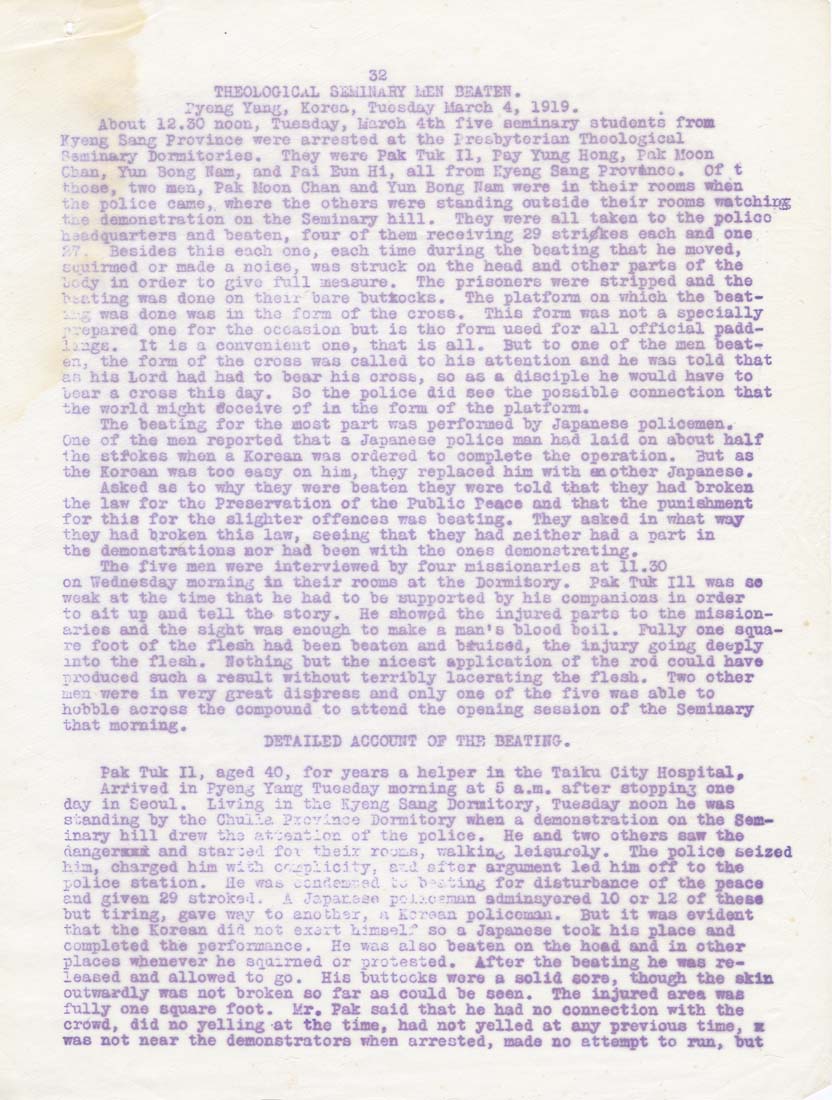32
THEOLOGICAL SiiilHAHY LEN BSATEH.
Pyeng Yang, Korea, Tuesday March 4, 1919.
About 12,30 noon, Tuesday, March 4th five seminary students frcaa
Kyeng Sang Province were arrested at the I resbyterlan Theological
- ■■•nary Dormitories. They were Pak Tuk II, Pay Yung Hong, pak Moon
-, Yun Bong Nam, and Pal Eun HI, all from Kyeng Sang Provtncc. Of t
I ooe, two men, Pak Moon Chan and Yun Bong Ham were In their rooms i^en
the police came, where the others were standing outside their rooms watchirgg
" - demonstration on the Seminary hill. They were all tsiken to the polloo
ijuarters and beaten, four of them receiving 29 strides each and one
Besides this each one, each time during the beating that he moved,
sculrraed or made a noise, was struck on the head and other parts of the
Iccy in order to give full aieasure. The prisoners were stripped and the
l';i;ting was done on their bare butkocks. The platform on which the beat-
; r; was done was in tho form of the cross. This form was not a specially
;> ;epared one for the occasion but is tho form used for all official padd-
iings. It is a convenient one, that Is all. But to one of the men beat¬
en, the form of the cross was called to his attention and he was told that
ao his Lord had had to bear his cross, so as a disciple he would have to
ooar a cross this day. So the police did see the possible connection that
the world might *ocelve of In the form of the platform.
The beating for the most part was performed by Japanese policemen.
One of the men reported that a Japanese police man had laid on about half
Ihe stfokes when a Korean was ordered to complete the operation. But as
the Korean was too easy on him, they replaced him with aaother Japanese.
Asked as to why they were beaten they were told that they had broken
the law for tho Preservation of the Public Peace aad that the punishment
for this for the slighter offences was beating. They asked In what way
they had broken this law, seeing that they had neither had a part in
the demonstrations nor had been with the ones demonstrating.
The five men were Interviewed by four missionaries at 11.30
on Wednesday morning In their rooms at the Dormitory. Pak Tuk III was so
weak at the time that he had to be supported by his companions in order
to alt up and tell the story. He showed the injured parts to the mission¬
aries and the sight was enough to make a man's blood boil. Fully one squa¬
re foot of the flesh had been beaten and b*ulBdd, the Injury going deeply
into the flesh. Nothing but the nicest application of the rod could have
produced such a result without terribly lacerating the flesh. Two other
iien were in very great dispress and only one of the five was able to
hobble across the compound to attend the opening session of the Seminary
that morning.
DETAILED ACCOUNT OP THE BEATING.
Pak Tuk II, aged 40, for years a helper in the Taiku City Hospital,
Arrived in Pyeng Yang Tuesday morning at 5 a.m. after stopping one
day in Seoul. Living in the Kyeng Sang Dormitory, Tuesday noon he was
s;-,anding by the Chuila province Dormitory when a demonstration on the 8«B-
inary hill drew tho atj'sntlon of the police. He and two others saw the
dangerami and star;ed foi. their roons, walking leisurely. The police seized
him, charged him wich cr-plicity, a .J. efter argument led him off to the
iolloe station. He wat) ucnde-L.-sd 'i,^ b cting for disturbance of the peace
and given 29 stroked. A Jcipansse pcJ.j.c?.rann adalnsyored 10 or 12 of thess
but tiring, gave way to anoth-sr, .; Krroan policeman. But It was evld^it
that the Korean did not exert hjmsel;:' so a Japanese took his place and
completed the performance. He wc^s also beaten on the head and In other
places whenever he siiaimed or protested. After the beating he was re¬
leased and allowed to go. His buttocks wore a solid sore, though the skin
outwardly was not broken so far as could be seen. The injured area was
fully one square foot. Mr, Pak said that he had no connection with the
crowd, did no yelling at the time, had not yelled at any previous time, ■
was not near the demonstrators when arrested, made no attea^t to run, but
|








